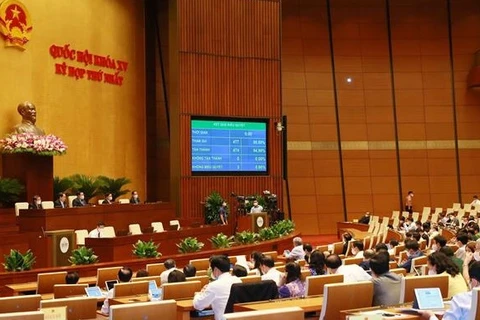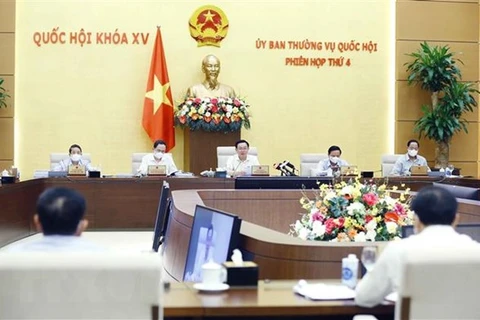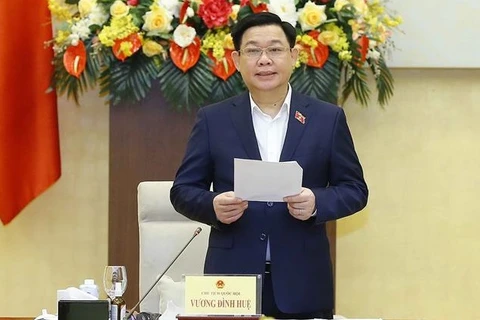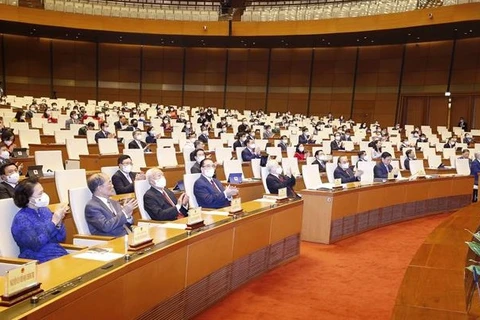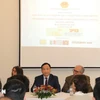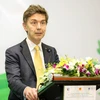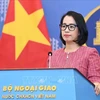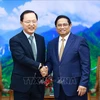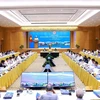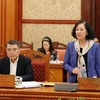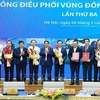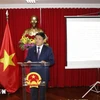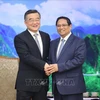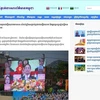 Prime Minister Pham Minh Chinh delivers a report on the implementation of the socio-economic development plan this year at the opening of the 15th National Assembly’s second session on October 20. (Photo: VNA)
Prime Minister Pham Minh Chinh delivers a report on the implementation of the socio-economic development plan this year at the opening of the 15th National Assembly’s second session on October 20. (Photo: VNA)Hanoi (VNA) – Vietnam is likely to fulfill eight out of 12 major socio-economic targets set for this year, Prime Minister Pham Minh Chinh told the opening of the 15th National Assembly’s second session on October 20.
PM Chinh held that despite the impacts of the COVID-19 pandemic, Vietnam has successfully maintained a stable macro-economy and kept inflation under control. The Consumer Price Index (CPI) only edged up 1.82 percent in the first nine months of 2021.
The PM reported that State budget revenue from January to September reached 80 percent of the yearly plan. The figure is expected to surpass the yearly target, providing sufficient funding for the country’s COVID-19 response and other major tasks. Budget deficit was under the estimated 4 percent of the Gross Domestic Product (GDP).
Total social investment is estimated to account for about 35 percent of this year’s GDP.
Export turnover exceeded 240 billion USD in the first three quarters of 2021. This figure is forecast to grow 10.7 percent this year compared to 2020. The country also saw declining interest rates, a stable forex market and improving foreign exchange reserves, he said.
He went on to highlight the government’s activeness and effectiveness in providing aid and ensuring social welfare for workers and employers affected by the pandemic. The country has paid attention to protecting people’s well-being and accelerating the development of remote health services and encouraging COVID-19 vaccination, medicine R&D, and production technology transfer.
The country has also further stepped up public administration reforms while maintaining security and social order while flexibly and effectively coping with issues at sea and along shared borders.
PM Chinh went on to say that four out of the 12 major socio-economic targets may fail to meet the set targets. In the first half of the year, the economy expanded at a rate of 5.64 percent. However, the economy shrank 6.16 percent in the third quarter as a result of the worst-ever COVID-19 resurgence which started in late April, making the nine-month economic growth to reach just 1.42 percent.
He voiced concerns over potential risks facing the macro-economy, increasing inflationary pressure, weakening exports and the upward trend of imports. Foreign trade still heavily relies on the Foreign Direct Investment (FDI) sector and a small number of foreign markets while there have been disruptions in the country’s supply chain and workforce, he noted.
The PM also took note of the declining resilience of the economy and the increasing number of workers forced to take temporary breaks or have working hours reduced or left jobless across the country.
Notably, the number of enterprises suspending operations or on the brink of bankruptcy has been on the rise. The ratio of non-performing loans has been also going up, causing multiple risks of the firms.
He attributed the negative trends to the growing complexity of the COVID-19 pandemic in Vietnam. It has caused a total of 23 cities and provinces, including a number of major economic hubs, to impose strict and lengthy social distancing measures.
To accomplish the goals this year, PM Chinh called on the country to exert all-out efforts on keeping the coronavirus at bay, particularly formulating specific development plans and scenarios that must be relevant to the actual situation
At the same time, ministries and agencies were urged to continue ramping up vaccine importation and production technology transfer; speeding up vaccination and coming up with a proper roadmap for the country to safely and flexibly live with the virus and revive socio-economic development.
The Government will continue reviewing and removing institutional obstacles by simplifying production and business procedures and helping enterprises minimise costs. The Government will also flexibly revise fiscal and monetary policies to maintain macroeconomic stability; sustain production and business; accelerate public investment disbursement; boost exports; and strictly control prices and markets./.
